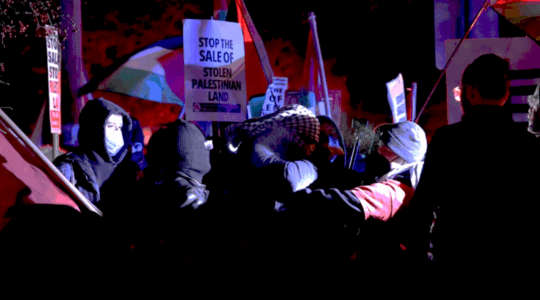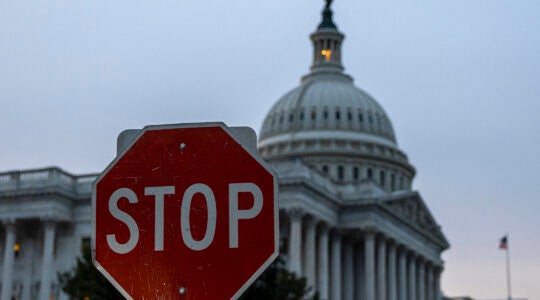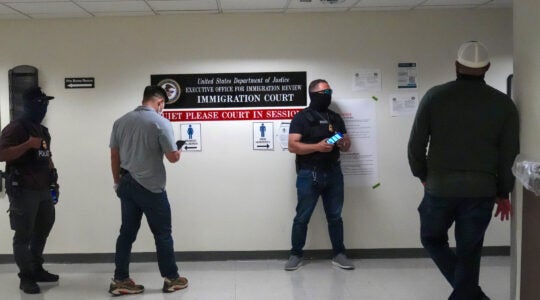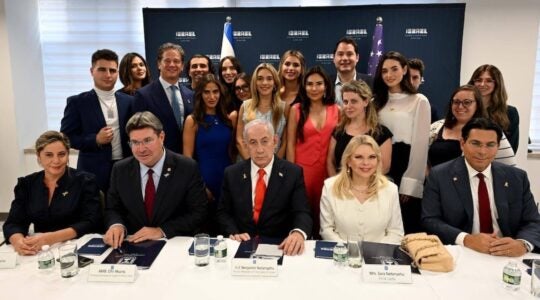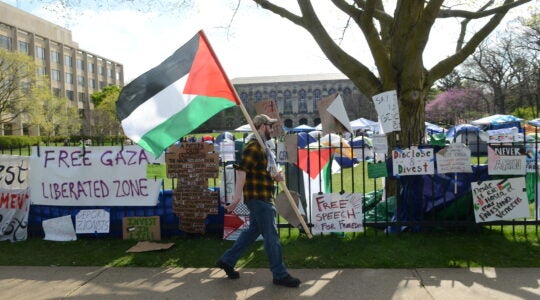The first time Yehuda Kaploun’s name entered the Congressional Record, it was because a senator named Joe Biden had elevated his concerns about antisemitism.
The second time came last week, 32 years later, when President Donald Trump, who preceded and followed Biden in the White House, formally nominated Kaploun to an ambassador-level role tasked with fighting antisemitism.
Taken together, the two moments might suggest a straightforward ascent from Kaploun’s time as a young firebrand and Brooklyn yeshiva student to government office — the potential capstone of the rabbi’s career.
But his path has been more complicated. Over the decades, Kaploun has occupied a unique place in Jewish communal life, cultivating influence through quiet diplomacy, high-level political connections and moments of controversy.
His story includes a longstanding relationship with the Adelson family and, before he died, Elie Wiesel; a deepening alliance with the political right; and a lawsuit involving allegations of infidelity and personal betrayal.
That lawsuit alleged that Kaploun conducted an affair with a married woman he met through his Orthodox congregation, and threatened her husband to keep it quiet. It was quietly settled just days before Trump announced the nomination.
If confirmed, Kaploun would become the most senior Hasidic Jewish official in U.S. government history. The position he’s been tapped for appears to have survived a broad restructuring at the State Department that eliminated many other roles. He is now slated for a Senate confirmation hearing, where lawmakers are expected to question him on his character, background, and worldview.
Kaploun declined to comment for this story, saying he was refraining from interviews until after the confirmation process. But last year, as he became more visible in Trump’s campaign, he acknowledged a shift in posture.
“I’ve always preferred working behind the scenes,” Kaploun told The Jerusalem Post at the time. “But given the challenges the Jewish community faces today, I realized it was time to speak publicly.”
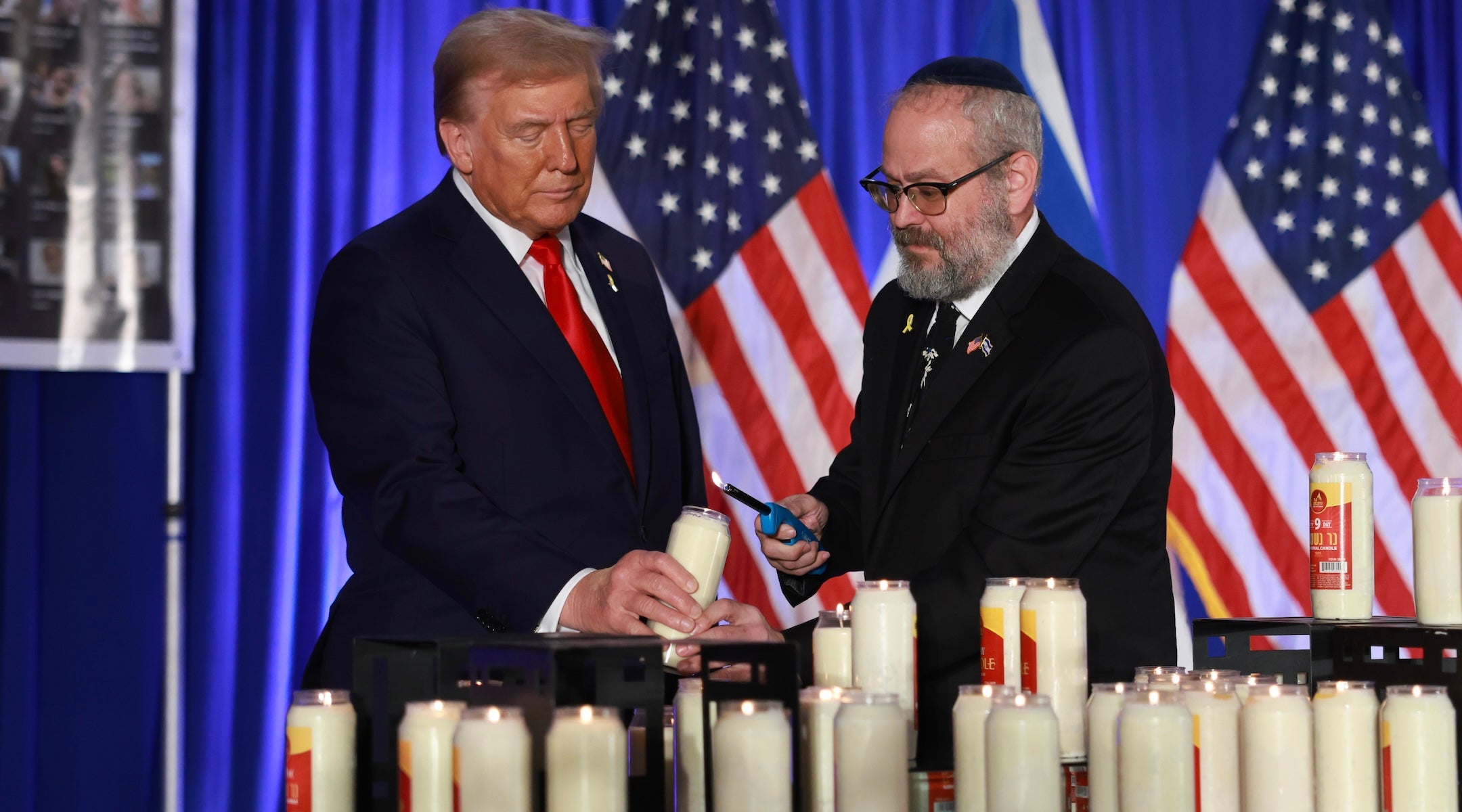
Donald Trump and Yehuda Kaploun light a candle during an Oct. 7th remembrance event at the Trump National Doral Golf Club in Doral, Florida on Oct. 07, 2024. (Joe Raedle/Getty Images)
Indeed, the confirmation process will thrust into the public spotlight a businessman and philanthropist whose political and civic engagement has typically occurred behind closed doors. At least twice, Orthodox publications have identified Kaploun as an askan. A term that comes from Hebrew and has been used colloquially in Yiddish, it means Kaploun is a communal advocate or fixer, quietly advancing communal interests, brokering connections or helping individuals.
For example, he regularly pays off the debts of shoppers at kosher grocery stores near his house, according to store’s owner, Yitzchok Spalter, who has known Kaploun for more than four decades.
“He comes in and says, ‘I know there are families that can’t pay their bills. Here’s a check for X amount of dollars. Take it off their tally,’” Spalter said in an interview. “He’s a good-natured person. He does good stuff people don’t even know about.”
The plaintiff behind the recently settled lawsuit, filed in late 2023 in Miami-Dade County, painted a different picture.
“Petitioner fears for his safety and life because Respondent Yehuda Shmaya Kaploun has threatened him in writing and orally, directly and indirectly, through a continued course of conduct that he will have him lose his job, that it well end up in a blood bath, that he will ruin his reputation and career unless Petitioner agrees to keep confidential the extra marital affair involving Petitioner’s wife,” the lawsuit alleges.
Court records show that Kaploun, who is married, denied the allegations, saying he was a friend and rabbinic confidant to the woman but never her lover. When pressed under oath in a court deposition for certain details of their relationship, Kaploun repeatedly invoked clergy privilege or refused to respond, but did acknowledge he told the woman she was attractive. Kaploun also filed his own lawsuit, accusing the husband of intimidation and harassment.
The legal saga, which has not been previously reported, included restraining orders against Kaploun and the husband and led to Kaploun’s departure from the synagogue where he had been a member for more than 15 years. The lawsuits were settled out of court with a signoff by a judge on April 1 — 10 days before Trump announced his pick of Kaploun. Terms of the agreement remain confidential and both sides said they are barred from speaking about the case.
Michael Diaz, an attorney for Kaploun, offered a comment on his behalf.
“This is an unfortunate situation between husband and wife that our client got dragged into, and it’s been resolved,” Diaz said. “Thankfully, it’s all behind him, and we wish the other parties a speedy resolution of their problems.”
While the case never went to trial, court records and interviews with congregants reveal how fallout from the dueling lawsuits — and the underlying allegations, which played a role in an acrimonious divorce — disrupted community life at Bais Menachem, a large synagogue in North Miami Beach affiliated with the Chabad Hasidic movement, where Kaploun had belonged for most of the time since he moved to South Florida from New York.
Early on, secretly recorded audio and video clips of Kaploun and the woman began circulating in the community, according to court records. One of Kaploun’s lawyers said in court that the recordings, whose exact contents are not specified in court records, ultimately led Kaploun to leave the congregation.
“It was used to harass Rabbi Kaploun,” the lawyer said, according to a court transcript. “It was used to defame him. It was used to spread an intention of malice throughout members of the congregation or the synagogue and animosity towards him. He was ousted essentially from his synagogue because of these materials.”
Bais Menachem got roped into the lawsuit when subpoenas arrived requesting security footage from the synagogue. Nearly a dozen congregants, as well as the head rabbi, Yosef Marlow, were summoned to testify. Marlow declined to comment for this story.
Few among the scores of people touched by the case were willing to speak on record about Kaploun’s nomination as antisemitism envoy, citing a range of concerns. Some said they were afraid Kaploun would harass them or use his political connections against them, and others said they were holding their tongues because of how the alleged affair and its aftermath might reflect on Orthodox Jews or on Trump, who is highly popular in Kaploun’s circles.
A congregant at the synagogue with personal ties to both Kaploun and the husband said he strongly supports Kaploun’s nomination.
“He’s a frontline soldier for the Jewish people,” the congregant said. “He helps people. He helps poor people with food. He helps widows. He goes after child molesters. He really, really steps up for the underdog.”
The congregant was closely familiar with allegations against Kaploun but said they shouldn’t be used to disqualify him.
“Should it prevent him from getting his job in the White House? No,” the congregant said. “Just because you’re a Jew, it doesn’t mean you’re perfect. I want him to succeed.”
The reluctance among some in Kaploun’s community to speak about him creates a void that has yet to be filled by voices from the wider Orthodox world, where there has so far been little public commentary about Kaploun or the milestone his nomination represents.
The newspaper Haaretz went so far as to suggest there’s conspicuous silence around Kaploun in an article titled, “Trump’s Pick for Antisemitism Czar Is a Chabadnik. Why Is the Movement Keeping Its Distance?” However, at least two Chabad institutions did, in fact, congratulate Kaploun: The Lubavitch Educational Center, a school in Miami Gardens, Florida, and Chabad On Campus International, an umbrella organization for university Chabad centers, praised Kaploun on social media following his nomination.
Kaploun’s bushy beard and kippah — hallmarks of his Orthodox identity — set him apart from all six previous antisemitism czars, the most recent of which said she has a positive impression of him despite their different ideological viewpoints. Biden appointee Deborah Lipstadt, a historian of the Holocaust told the New Yorker she recently spoke to Kaploun about fighting antisemitism and that “he seems to really care about this deeply and genuinely.”
Kaploun, the eldest of five children, was born in Israel but has been an American citizen from birth through his mother, Dreizel, a Connecticut native. A member of the Hecht family, she married Yaacov Kaploun, an Australian, uniting two prominent lineages within the Chabad-Lubavitch movement.
When Yehuda was a toddler, his father completed his rabbinic studies and the family left Israel, spending a few years in Connecticut, where Yaacov began his career as a Jewish educator. They later moved to Ottawa, Canada, where Yaacov became the director of Hillel Academy, the Jewish day school Yehuda attended.
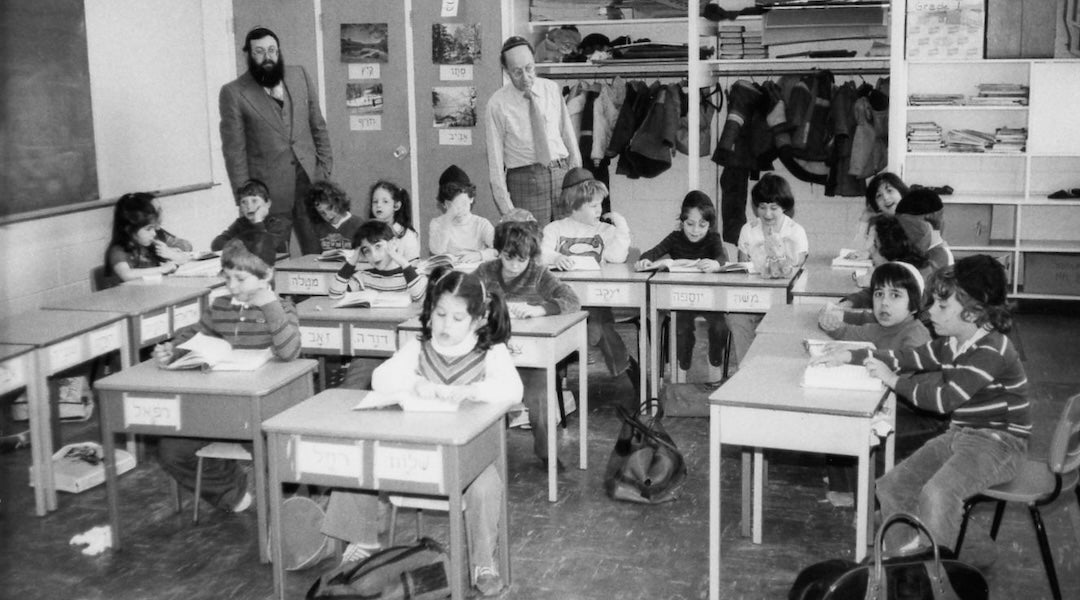
Yehuda Kaploun’s father, Yaacov Kaploun, who is standing in the back left of the classroom in this photo from the 1974-75 school year, was the director of Hillel Academy, a Jewish community day school in Ottawa, Canada. (Ottawa Jewish Archives 6-145-04)
From a young age, students at Hillel were taught French, English, and Hebrew, with at least half of the curriculum devoted to secular subjects and the remainder to religious studies. It served students from a range of religious backgrounds and later merged with another community day school.
“We are trying to produce well-rounded citizens who are aware of their heritage,” Yaacov told a reporter at the time, speaking of the school’s mission.
Yehuda made his media debut at age 10 when he joined the throngs welcoming Israeli Prime Minister Menachem Begin at the airport during an official visit to Canada in 1978. Pressed up against a rope barrier, he was seen “waving a welcome banner twice his height for all he was worth,” a local newspaper reported, adding that he spoke proudly: “I was born in Israel and my principal told me I have to represent my school well.”
The visit came soon after the signing of the Camp David Accords between Israel and Egypt. A group of students held up a sign in Hebrew that read, “We are blessed by your arrival, Menachem Begin, Pursuer of Peace. May the Lord help you.”
While her husband was in meetings, Israel’s first lady, Aliza Begin, toured Hillel Academy, where Yehuda’s sister presented her with a corsage.
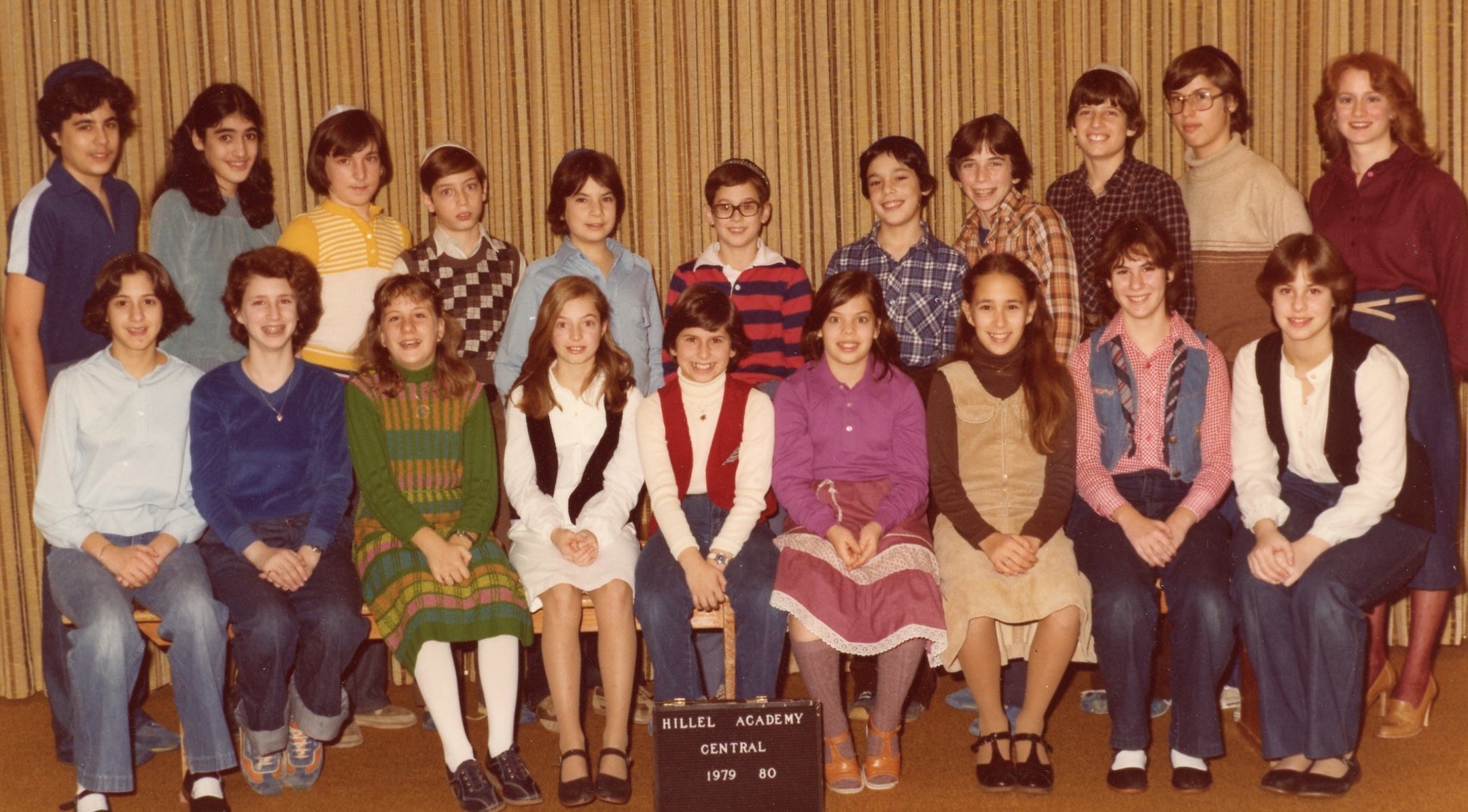
Yehuda Kaploun is the child with the glasses in the center in his seventh-grade class photo from the 1980-1981 school year at Hillel Academy in Ottawa, Canada. (Ottawa Jewish Archives 6-335-012)
Whether the fanfare of the visit left a lasting impression on Yehuda is unknown, but many years later he would organize a similar encounter between a government dignitary and Jewish students. In March 2025, two weeks after Linda McMahon became Trump’s secretary of education, Kaploun brought her to tour the Lubavitch Educational Center in Miami.
As an adult, Kaploun moved to the heart of the Hasidic world in which he was raised, joining the thousands of Chabad followers studying at rabbinical schools in Brooklyn. When he was deposed, Kaploun stated that he took classes at Hadar HaTorah, a yeshiva in Crown Heights that, according to its website, “serves students who did not grow up learning and came to it later in life.” (Kaploun said his ordination test was ultimately administered by the chief rabbi of the Israeli city of Eilat, Yosef Hecht, who is his uncle.)
Being in Crown Heights during the early 1990s — physically close to Chabad’s leader, Rabbi Menachem Mendel Schneerson, before his death in 1994 — is a major point of pride among Chabad followers, a privilege only those of a certain age can claim. At Schneerson’s funeral, Kaploun was quoted in the press calling him “the Moses of our generation.”
The timing also meant that Kaploun was present in August 1991 when a car in Schneerson’s convoy ran a red light and struck two young Black children, killing one. The accident set off three days of riots, during which Black residents attacked Orthodox Jewish residents and businesses. The Crown Heights riots are considered the most serious outbreak of antisemitic violence up to that point in American history.
During the mayhem, a group of rioters murdered 29-year-old Yankel Rosenbaum, an Orthodox Jew from Australia who was in town conducting research for his dissertation at the University of Melbourne. According to an account Kaploun would later give, he knew Rosenbaum well.
“It was in this setting that my close friend, a wonderful, well-respected human being, a king and gentle scholar, a man with a zest for life…was murdered in cold blood,” Kaploun wrote decades ago in a public letter condemning the NYPD’s response to the riots.
Kaploun’s personal history with the antisemitic violence makes him stand out as a potential antisemitism czar and could strengthen his case, especially among those who also have firsthand memories of the riots.
Rabbi Motti Seligson, a spokesperson for the Chabad-Lubavitch movement headquartered in Crown Heights who lived through the riots as a child, said Kaploun’s background is noteworthy. (Kaploun is not an official representative of the movement or an employee of any of its affiliated institutions.)
“Having witnessed the Crown Heights riots surely gives him a deeply personal understanding of antisemitism,” Seligson told JTA. “That experience, combined with living today as a proudly visible Jew, arguably brings a perspective that is unprecedented to this role.”
After the riots, Orthodox Jewish leaders and political opponents of New York Mayor David Dinkins and Police Commissioner Lee Brown — both Democrats — sharply criticized how the city responded. They claimed the officials prioritized racial sensitivity over public safety, and alleged that police were held back, allowing rioters to continue venting unchecked.
Kaploun continued pressing these accusations for years. In 1993, for example, when Brown was nominated to serve as Bill Clinton’s drug czar, Kaploun tried to testify against him during Brown’s Senate confirmation hearing — the same kind of hearing Kaploun will soon face as a nominee to serve in the Trump administration. Though he was not permitted to speak, then-Sens. Arlen Specter and Biden raised his concerns and entered into the congressional record a scathing letter Kaploun had written about Brown.
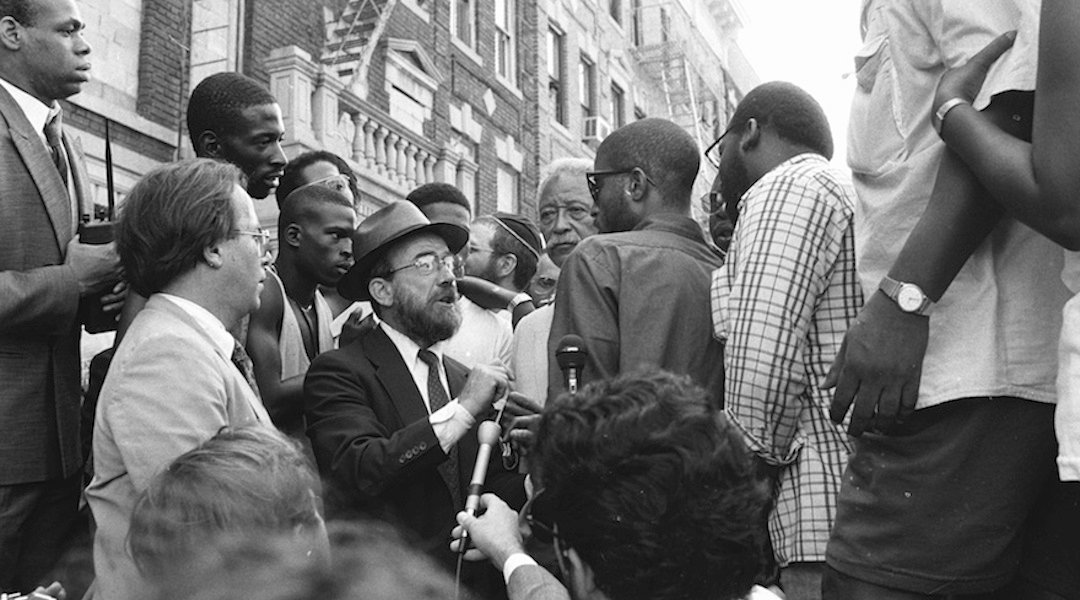
Then-Mayor David Dinkins, center, looks on while a Jewish man and a Black man argue during riots in Crown Heights, Brooklyn, in August 1991. (New York Daily News Archive/Getty Images)
The letter makes an impassioned case that a presidential nominee should be judged according to the morality of their conduct, especially in moments of crisis.
“If honor, oath of office, fidelity to principle, respect for our constitution, the laws emanating from them, the civil rights of all people, are elements in the measurement of the character of our leaders, it is my opinion that this nominee fails to make the grade,” Kaploun wrote.
He continued, “To reward this nominee with cabinet-level status at this time is an insult to the injured of Crown Heights. What standard do we present to the families that huddled in the corners of their homes while bricks and rocks and bottles smashed their windows, splattering debris around them?”
Brown, who denied the accusations against him, was confirmed unanimously.
Rudy Giuliani took over City Hall in 1994, ushering in Republican leadership in New York. During Giuliani’s years in office, Kaploun secured a position in the offices of the police and fire commissioners as a liaison to the Hasidic community. He became prominent enough as a community activist that, in 1997, Nobel laureate Elie Wiesel reportedly asked him to help establish a foundation serving children with disabilities.
Kaploun and his father went on to run the Moses and Aaron Foundation for more than a decade. The foundation was best known for hosting annual musical concerts showcasing the talent of the children it served. It also raised money for medical equipment and gave out toys. A range of elected officials recognized the foundation for its work, including Giuliani’s successor, Mike Bloomberg, and Jerry Nadler, the long-serving New York congressman, both of whom are Jewish.
Nadler, a Democrat representing a district with one of the highest Jewish concentrations in the country, has been outspoken in his opposition to Kaploun’s nomination, accusing him of lying about Biden’s record on antisemitism. In a statement to JTA, Nadler also said that Kaploun should be disqualified from confirmation based on the same reasoning Kaploun used in the letter to the Senate about Brown’s nomination more than three decades ago.
“Rabbi Kaploun fails to live up to his own standards for a nominee — his demonization of the very leaders and people who have championed the effort to counter antisemitism in America demonstrates his lack of ‘fidelity to principle,’” Nadler wrote.
The Moses and Aaron Foundation was ultimately shut down because the leadership felt its mission had been accomplished amid wider societal recognition for children with special needs, Kaploun said in one of his recent depositions.
Kaploun’s tracks mostly faded in the late 1990s — until 2006, when the New York Post ran a cover story about Kaploun’s shirt. It was a white button-down shirt he reportedly wore during the 9/11 attacks. Kaploun arrived at the World Trade Center before the towers fell and spent the next 48 hours trying to save people, according to the Post, an account that’s consistent with what Kaploun told The Ottawa Citizen newspaper just weeks after the attack. He said he witnessed Building 7 collapse on firefighters, including his friend the fire department chaplain, who had entered to help those trapped inside.
Kaploun told the Post, “The Fire Department chaplain, Father Judge, always said to me, the son of a rabbi, ‘When you’re a member of the clergy, you always have to have an easy smile.’ And he always did. He was a good man. An easy man.”
Kaploun sealed his shirt in a plastic bag, and about five years after the attacks, he gave it to the Post, which sent it for laboratory testing. The results showed “sky-high toxic levels of potentially deadly asbestos,” the Post reported, highlighting alarming findings about long-term health impacts on 9/11 first responders.
Around that time, Kaploun entered the business world. He founded Kap Consulting Group, capitalizing on his knowledge of government and his knack for making powerful connections. Among the prominent people he became acquainted with in New York was the future president, Donald Trump, Kaploun told the Jerusalem Post last year.
The work involved “consulting with people who needed to navigate the system of who to talk to, what to talk to, how to get their calls returned,” Kaploun said in a deposition. “Assisting people who are trying to deal and navigate the bureaucracy [of] government.”
Kaploun, his wife, and their small child moved to the Miami area soon after, joining a steady stream of Orthodox Jews flocking to South Florida in search of economic opportunity and a supportive environment for their religious way of life.
It’s in Miami that newspapers started referring to him as Rabbi Kaploun. The founder of the Florida Orthodox Jewish Association, Kaploun threw himself into Florida politics: He protested Barack Obama, engaged with the mayor of Miami, and made a powerful friend in Marco Rubio, the future secretary of state under Trump, and Kaploun’s boss should he be confirmed. At a gathering with local rabbis during Rubio’s 2010 Senate campaign, Kaploun gave him a mezuzah, which Rubio said he would affix to his doorpost in Washington, D.C.
Kaploun has said that he and Trump have been friends for decades, dating back to their overlapping years in New York, but it’s in Florida that the two became publicly linked to each other for the first time.
At the time, Kaploun was one of the heads of the American division of an Israeli tech company called Watergen, which develops machines that pull moisture out of the air to produce potable water. Kaploun had gotten the late casino magnate and pro-Israel Republican megadonor Sheldon Adelson interested in the technology and Adelson secured meetings for Watergen with the head of the EPA during Trump’s first term in 2017. The EPA later signed a high-profile deal to test Watergen’s products.
Then, in 2018, Trump hosted Kaploun at his Mar-a-Lago estate for a demonstration of Watergen’s technology. Joining Kaploun was his business associate, Ed Russo, who had previously worked as an environmental consultant to Trump’s companies. Kaploun and Russo went on to found a competitor to Watergen called RussKap, which they continue to operate today. Earlier this year, Russo was tapped to lead the White House Environmental Advisory Task Force.
Kaploun’s first publicly known political work on behalf of Trump came ahead of the 2020 presidential election. He organized a campaign event in Florida for Trump’s running mate, Vice President Mike Pence. At a gathering with dozens of rabbis and Jewish community leaders, Pence said that Trump is “a true champion of the Jewish people.” The campaign’s messaging resonated with Orthodox Jews, who voted for Trump in large numbers even as the overall Jewish vote overwhelmingly favored Biden.
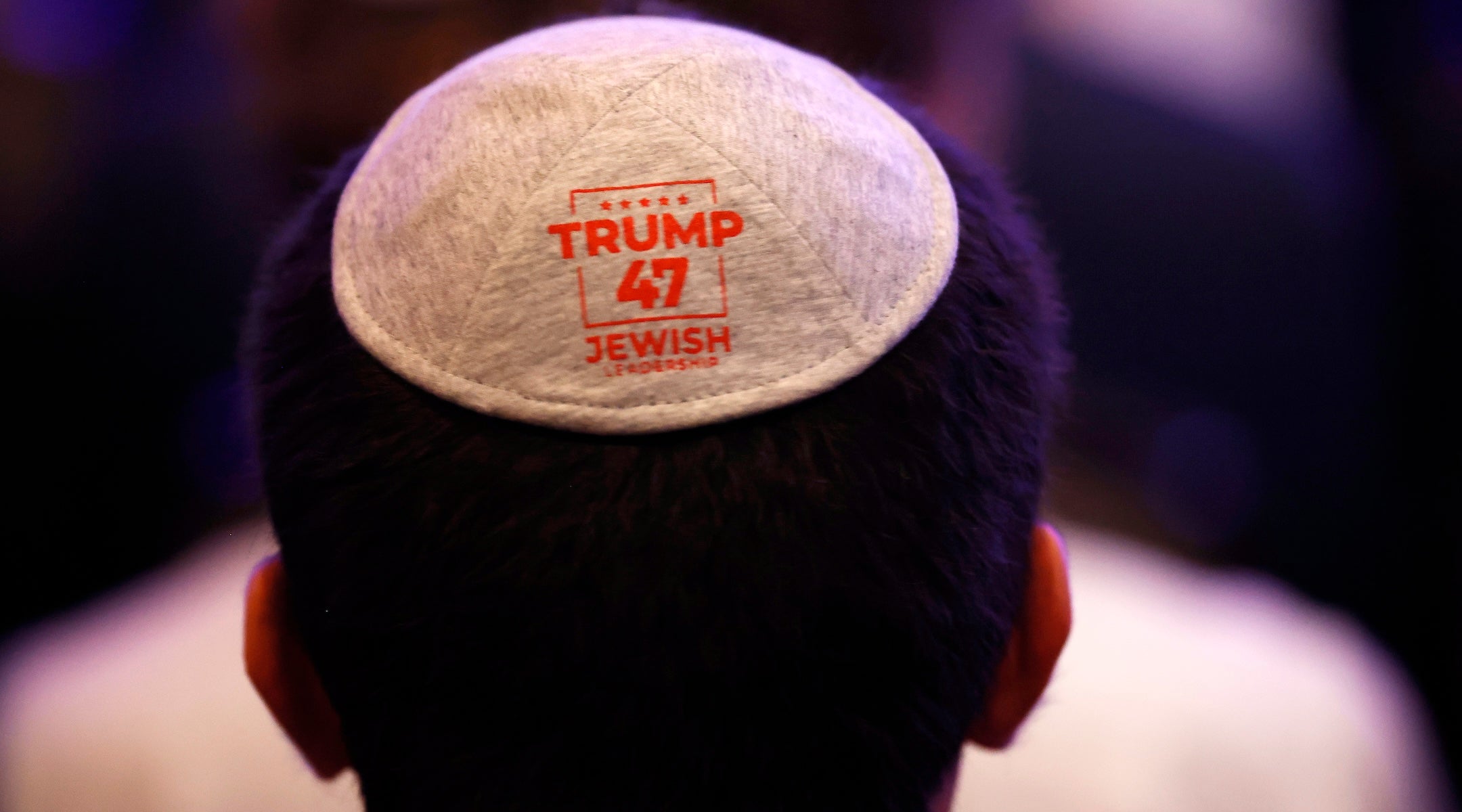
A Jewish student wears a kippah given to him Donald Trump’s campaign during a speech before prominent Jewish donors titled “Fighting Anti-Semitism in America” at the Hyatt Regency Capitol Hill in Washington, DC. on Sept. 19, 2024. (Chip Somodevilla/Getty Images)
Trump’s 2020 loss initiated a period of turmoil in Kaploun’s private life. It was around this time that a local family — a husband, wife and four children — with a kitchen malfunction needed somewhere to have Shabbat dinner. Kaploun hosted them, and from there, a friendship developed.
The couple was having marital problems and, one day, the husband filed for divorce. The dispute turned increasingly messy and the husband came to blame Kaploun for playing a role in the situation, claiming his wife and Kaploun were having an affair. The conflict escalated and the two men sought restraining orders against each other. Kaploun left his synagogue community amid the legal fighting. He would soon find himself occupying a broader stage.
In 2024, he emerged publicly in a prominent role in the Trump campaign. Over several months, Kaploun organized a series of high-profile events where Trump spoke about supporting Israel and combating antisemitism. It was at one of these engagements that Trump said Jews would be to blame if he were to lose the election.
Miriam Adelson — Sheldon’s widow, who was carrying on the couple’s traditional role as a Republican kingmaker — also spoke during the events, including at one commemorating Hamas’ attack on Israel on Oct. 7 of the year before.
Soon after, the Orthodox magazine Mishpacha declared Kaploun “the Orthodox face of the former president’s race.” He told the magazine that the United States appeared on the verge of reprising the situation in the earlier years of Nazi Germany, when many Jews failed to appreciate the gravity of the danger they were facing.
“Our situation is similar to that of Jews in 1930s Germany, on the eve of Kristallnacht,” he said. “They, too, lived in peace and quiet until the ground shook under their feet. And in the United States, the ground is already shaking.”
When Trump won, Kaploun promised a champion for Jewish safety in the White House, an American leader who would give Israel the freedom it needed to fight its war with Hamas in Gaza. He also openly contemplated a role for himself in the next administration.
He was envisioning a far more important role than he’d ever held before.
“If I feel that what he’d like me to do will have an impact on the global picture of how Jews are seen and treated, I’d absolutely consider it,” Kaploun told the Jerusalem Post. “But it has to be meaningful. I’m not interested in being a ‘Jewish liaison’ or a token representative. If I take a position, it’ll be something trailblazing.”
He wanted a job fighting antisemitism abroad — and Trump gave it to him. Now, he has to convince the Senate to support him.
JTA has documented Jewish history in real-time for over a century. Keep our journalism strong by joining us in supporting independent, award-winning reporting.

